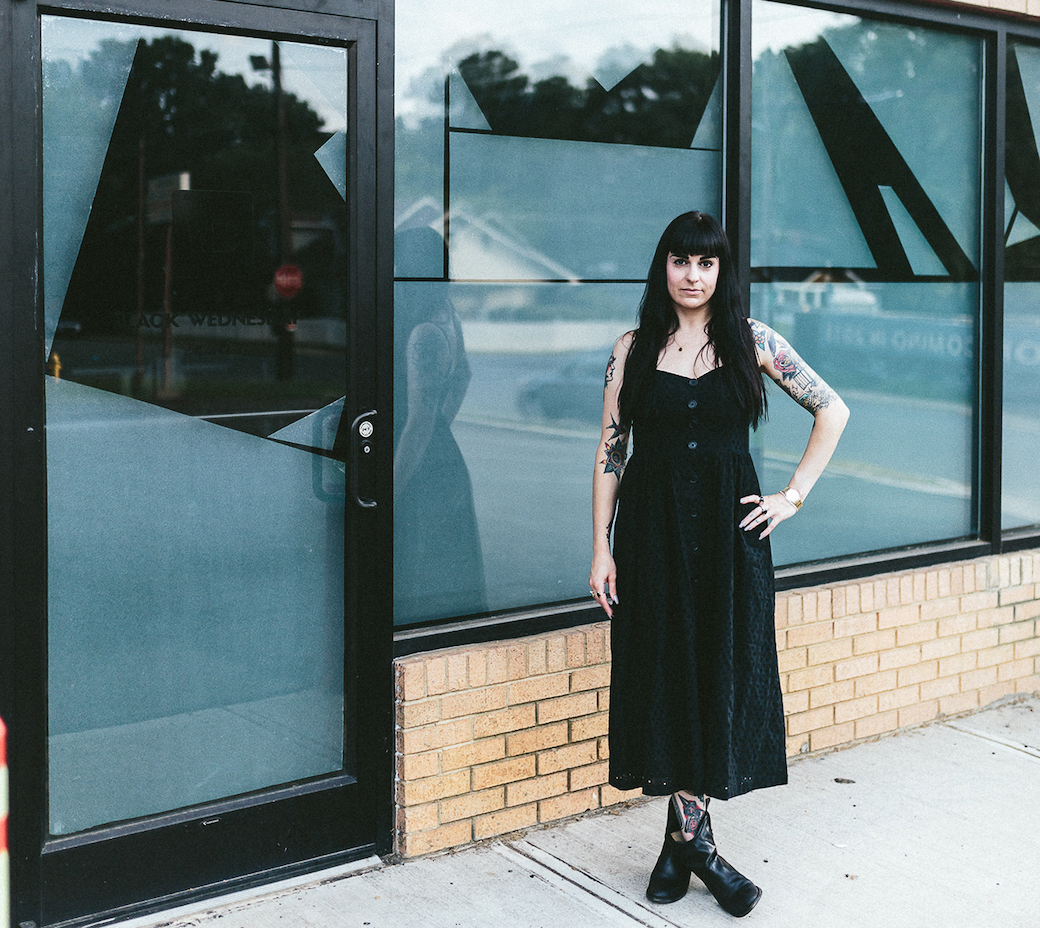
Hot take: Work-life balance is overrated, says Black Wednesday’s Corri Smith
By Melissa Oyler
It’s 9 a.m. on a Friday, and Corri Smith is sitting at her desk going through emails. That in and of itself may be unremarkable, but it doesn’t take a lot of investigative work to realize that she’s been settled in for hours.
Around her, the dark-by-design NoDa office is alive with the personality of Smith and her marketing and PR company, Black Wednesday. She’s had her coffee, the music is on, the candles are lit. Plenty of people collect candles, but who actually lights them — every day?
Smith, that’s who. She makes the time to dot the i’s, cross the t’s, light the candles. Smith works 90 hours a week, and logging those hours might lead one to wonder not only why but how. Even the basics such as getting dressed, brushing teeth or showering might feel like too much effort.
How does she manage a work-life balance? Actually, the business owner of the company projected to earn $1 million this year said she doesn’t — there’s no such thing in her world.
Working long hours is in Smith’s blood — she was doing it for years before Black Wednesday was ever born. If her time dedication isn’t proof enough, the multiple jobs she held at once in the past, even while earning her master’s degree, certainly furthers the point.
Every day she is at her office by 7 a.m., freshly showered, makeup perfect, outfit on point. By the time her employees — 4 full time, 2 part time and rotating interns — arrive, she’s already long settled into her day.
She said she finds it easy to work so much because she is doing what she is drawn to do. “Everything is the good part. Even the shitty stuff is great. When you realize this whole thing is a pile of blessings, it’s really easy to live every day with a grateful spirit,” Smith said. “I get to do what I love all day long and on the weekends and at night. It’s where some of the glamour comes from.”
Those days are long and busy, with Smith both managing her own accounts and acting as gatekeeper for the ones managed by her staff. She has approximately 27 clients, most of whom she connects with at least every other day. She sends out press releases and pitches. She plans events. She manages all of the business and administrative work for the office.
And after everyone goes home, Smith continues doing business, often into the night. She stops working only when it’s time to crash — her 5:30 or 6 a.m. wake up comes early.
Fighting against balance in a world that seeks it out
Head down and game face on doesn’t come without consequence, she said. “My biggest challenge is not letting other people’s projections of societal norms make me feel bad. It’s really difficult when friends or family — or guys, even — tell you that you shouldn’t be working so much.”
It’s OK if the people in her life don’t understand her work schedule, but she said it’s difficult not to let it get to her when others are projecting on her. “Being on your own can be very isolating, so it doesn’t help to make me feel guilty on top of that,” she said.
Smith may feel isolated, but in truth, she is not alone in her all-work-no-play world. Elon Musk recently received backlash after tweeting that no one ever changed the world on 40 hours per week.
The Tesla and SpaceX CEO said he had cut his work hours from 120 a week to 80-90 hours, a schedule he called manageable, although he has said he relies on Ambien to manage his stress level enough to allow sleep.
An 80-90 hour work week can have a negative impact on someone’s health, CNBC reported after Musk’s tweet. Amid health concerns listed were sleep sacrifice — without the ability to recharge, too much work can lead to depression, anxiety or illness.
Does Charlotte work too much?
Yet, in a world where work-life balance is being stressed more and more, working long hours is something many Charlotteans can relate to — many of whom moved here specifically for the city’s job opportunities. Forbes ranked Charlotte No. 5 in its list of best U.S. cities for jobs in 2018.
In September, Smith conducted an unscientific Twitter poll where she asked participants how much they work. While her network is largely comprised of other entrepreneurs like herself, she was still surprised to see that 48 percent cited a workday of 10 hours or more.
“Specifically in Charlotte, we have big corporations and banks. If you’re not out here like us, doing your own thing that requires a bunch of work, you’re probably doing the corporate thing and ladder climbing,” Smith said. “You have to put in the work to move up the totem pole.”
When Smith does get out, she recharges by having dinner and drinks with friends, dancing it off at Chakti Yoga, visiting Europe — primarily Spain — or going to concerts. Among her favorites include Radiohead, Explosions In The Sky, Yeah Yeah Yeahs and Raleigh/Durham-based Sylvan Esso.
But mostly, Smith thrives on work. “I spend a lot of time trying to help other people. There’s a weird glamour people assume about owning your own business that is mostly false. It’s never easy, and it’s sometimes not fun.”
Yet, it pays off — literally.
Black Wednesday will turn 4 in March. Smith said she read a Forbes article stating only two percent of women-owned businesses ever earn $1 million in revenue. She’s ready to turn that negative statistic into a positive, she said. “The positive is I’m going to crush that goal in Y4,” she said.
Being in the two percent may feel good, but it’s not enough, she said. “I’m going to un-prove the statistic. It will have a larger impact in some shape or form. That’s what drives me. Let’s make it 100 percent. We need to create space for women to be successful — on their own if they want.”
There’s something empowering about this, she said. “If women see other women being successful and those women reach back and help, that’s where the magic happens.”
At the end of the day, this desire to succeed and to help others succeed is what motivates Smith every day to get to the office, drink the coffee, light the candles and do the work.
“Everyone has different drivers. I’ve been asked before: ‘Why do you get up and do this every day?’” Smith said. “I feel like our lives on this planet are a limited-time offer. We should go for broke. Most of the time, that means doing what you’re passionate about and what lights you up. If you fail, you fail — but at least you tried.”
VIA CHARLOTTE FIVE


